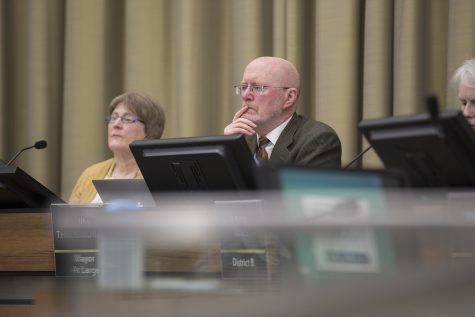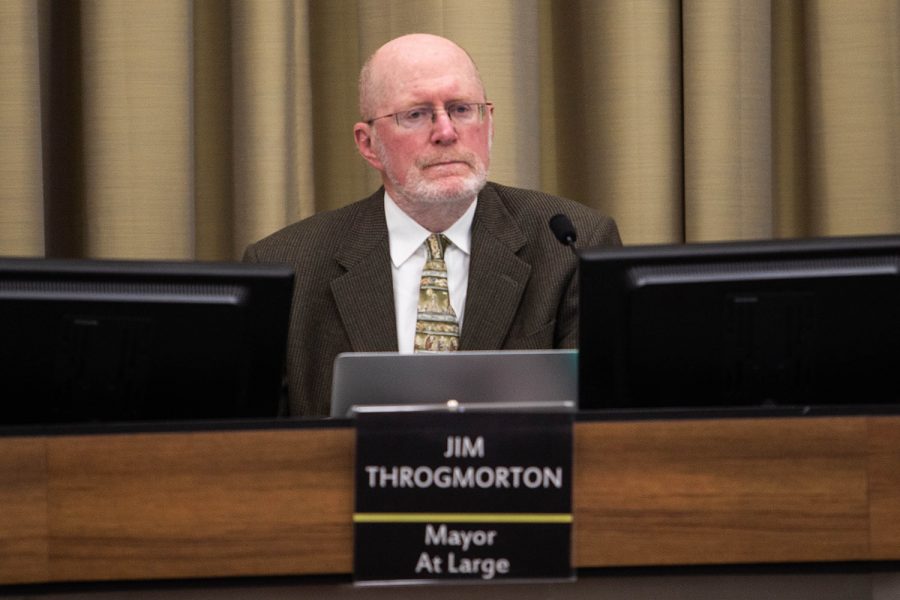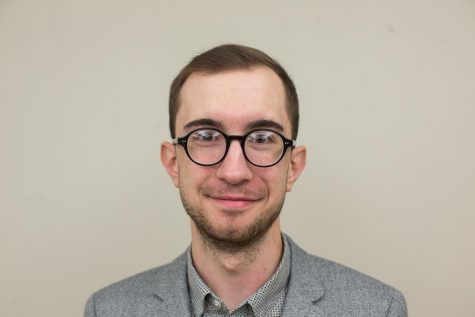Throgmorton reflects on mayorship, ever-growing city
Former Iowa City Mayor Jim Throgmorton reflects on his tenure in the confines of City Hall.
Iowa City Mayor Jim Throgmorton listens to public hearings during a City Council meeting at City Hall on Monday, November 4, 2019.
January 20, 2020
For former Iowa City Mayor Jim Throgmorton, the confines of City Hall are not an unfamiliar atmosphere. He has presided over periods of transition — especially in the realm of policing and sustainability — over three decades in Iowa City.
Throgmorton served on the Iowa City City Council in the 1990s and taught as a professor of urban and regional planning at the University of Iowa, but a return to public service was not always at the forefront of his mind.
“At a certain point in early 2011, however, I started thinking about the breadth of knowledge I had about Iowa City,” he said. “I thought to myself, ‘I’m retired now and could use my time and ability to help this city.’ It was also…important to keep in mind that the city had changed so much since I first arrived.”
One such change, Throgmorton said, was not simply a policy or initiative — it was a change in mindset among Iowa City’s police force. During the 1990s, he said, many police forces were instructed to more strictly enforce laws and train their eyes toward “troublesome” areas of town. Although this approach may sound good on paper, he added, it led to the abuse of power and fear among historically marginalized communities.
The southeast side of Iowa City was of particular interest to the police at that time, and — curious about the potential socioeconomic and cultural differences that caused apprehension toward this area of the city — Throgmorton partnered with academics from the UI to prepare a three-part series titled “words matter, maps matter, stories matter.”
This series focused on the language used to describe the southeast side, how Iowa City residents viewed its geographical location, and how stories varied amongst different groups of people.

Iowa City Mayor Jim Throgmorton listens as community members address complaints regarding the new benches for the Pedestrian Mall at City Hall in Iowa City on Tuesday, January 22, 2019. Some community members feel that the new benches are hostile to the homeless.
“There were misconceptions about crime, and many people didn’t even know where the southeast side was,” he said. “And from an African-American point of view, the police were to be feared. There was some traction in the council at the time [to discuss race relations in Iowa City,] but councilors were afraid to say ‘the wrong thing’ and some preconceived notions about racial differences had already been ingrained.”
As he began to meet with city leaders and form committees that questioned the roots of race-related issues in Iowa City, Throgmorton said he also began to understand the importance of [professionals] building and strengthening relationships within different communities. The question of how this would be done, however, was the subject of cantankerous conversations both inside and outside the confines of City Hall.
“What we ended up doing was identifying people who could reasonably be appointed to boards and commissions so we could diversify their membership,” Throgmorton said. “We also started publicly reporting on the disproportionality in traffic stops and other police activity.”
This disproportionality, he added, focused on every aspect of police operations, whether that meant traffic stops, arrests, and searches of vehicles. Throgmorton said Iowa City Police Chief Jody Matherly, who was appointed in 2016, has been integral in the transformation of Iowa City’s police.
“As new officers are brought on board, this change in mindset and operation has been made very apparent,” he said. “Jody [Matherly] has brought on great officers, and we have been teaching them about de-escalation techniques and where those tough conversations should go.”
Throughout his time in Iowa City, Throgmorton said it has been rewarding to watch topics such as excessive policing move to the forefront of the conversation.
Another subject “near and dear” to the former mayor’s heart — climate change — is best showcased by the October 2019 visit from climate activist Greta Thunberg, he said.
Throgmorton recalled with great fondness the thousands that gathered in downtown Iowa City on Oct. 4 to hear Thunberg, adding that the passion for climate justice was palpable and calls to action were seemingly present long after the sizable crowd had dissipated.
“Our city government has a long-standing commitment to sustainability-related issues. If you look back, we created our first emissions inventory for carbon dioxide and greenhouse gasses [10 years ago],” he said. “One of the things that was clear to me when I was seeking reelection in 2015 was that we were doing nowhere near enough.”
This mindset, he said, was shared by others in the city government. These efforts presented themselves as a comprehensive climate action plan and the incorporation of sustainability targets within the city’s strategic plan as well. This commitment paired well with similar moves by the UI, he said, such as a series of 2020 sustainability targets and a commitment to being coal-free by 2025.
“Taking effective climate action requires significant changes in the way we all live,” he said. “It’s not just infrastructure, it’s the way we live and existing patterns of behavior. I think a common misconception is that we can suddenly change the environment with a snap of our fingers. That is simply not the case.”
When discussing issues that are salient to both the university and city communities, Throgmorton said it is important to keep in mind that Iowa City extends outside the confines of the downtown area.
“A mindset where Iowa City only includes areas x, y, and z hinders a person’s ability to act effectively and have reasonable comments about different issues,” he said.
Looking forward, Throgmorton said he is excited to see the areas in which Iowa City continues to expand. As two new city councilors and a new mayor begin to navigate the triumphs and turmoil of an ever-growing college town, one thing is for certain: Throgmorton will continue to serve as a sounding board for the issues facing Iowa’s UNESCO City of Literature.
“In the short term I don’t intend on doing too much,” he said. “There’s a fair amount of scholarly work I want to do, and I’m interested in learning more about my family’s lineage … even though I am outside of City Hall now, I will always pick up the phone for anyone who has a question or wants me to weigh in on something.”
















